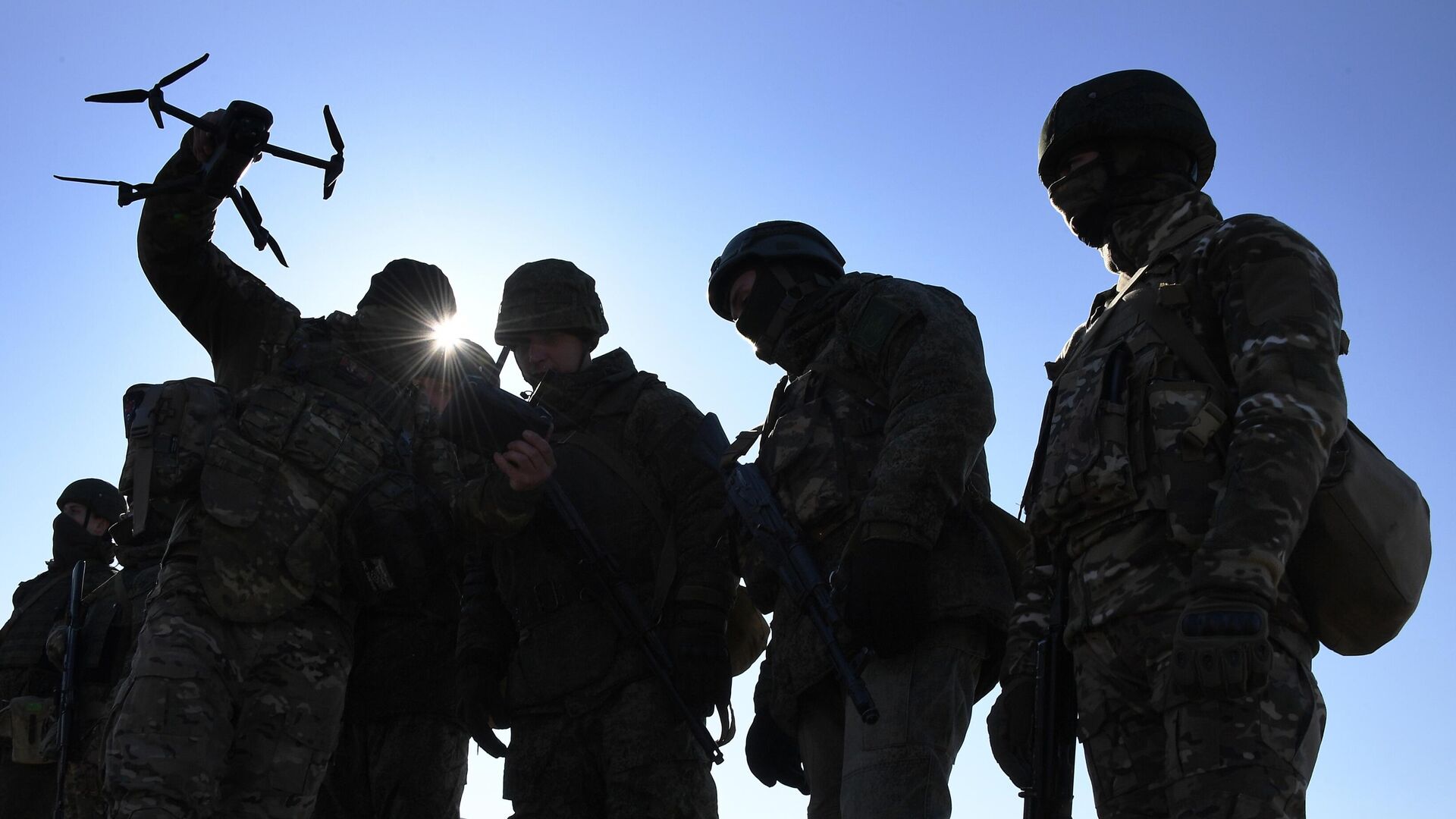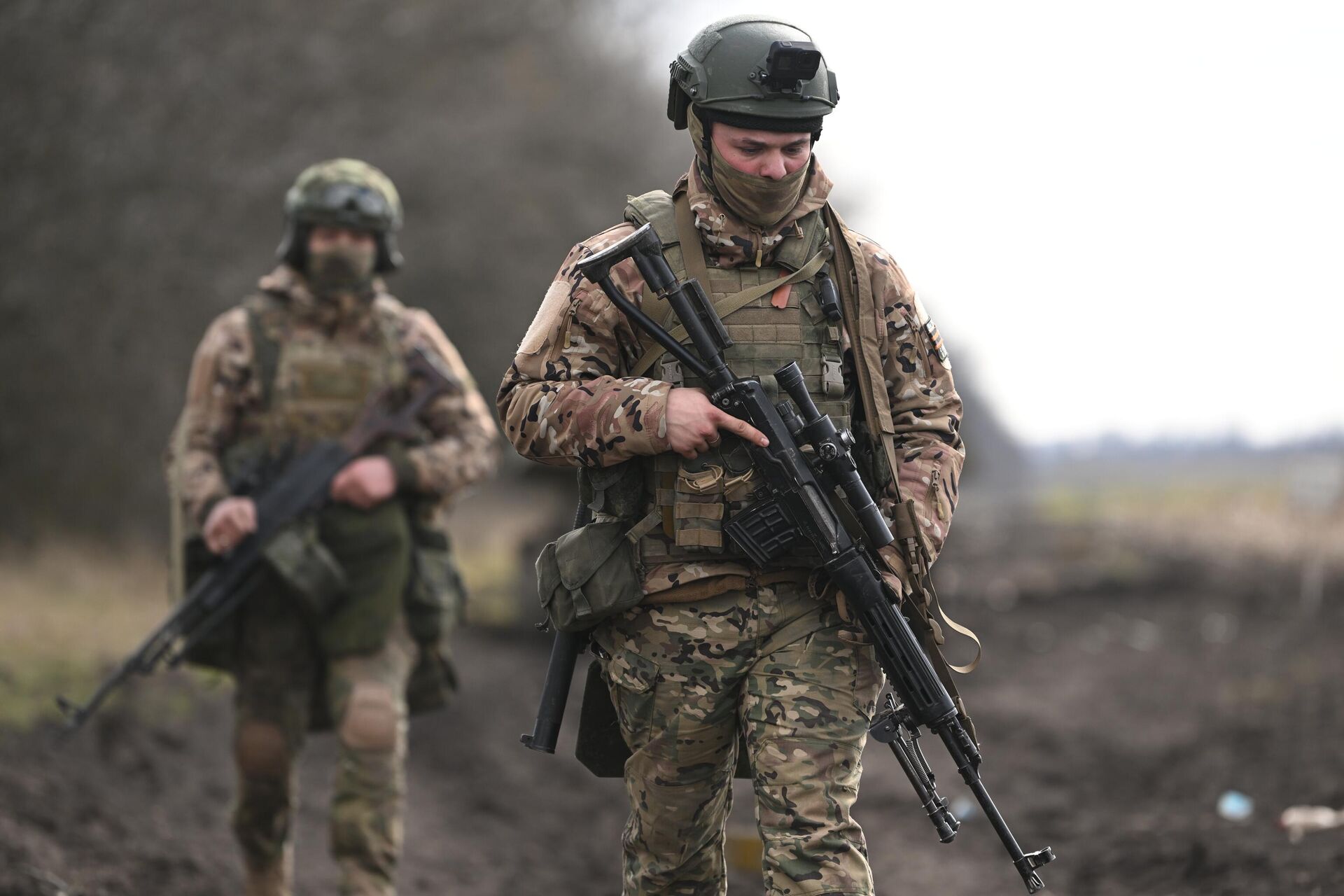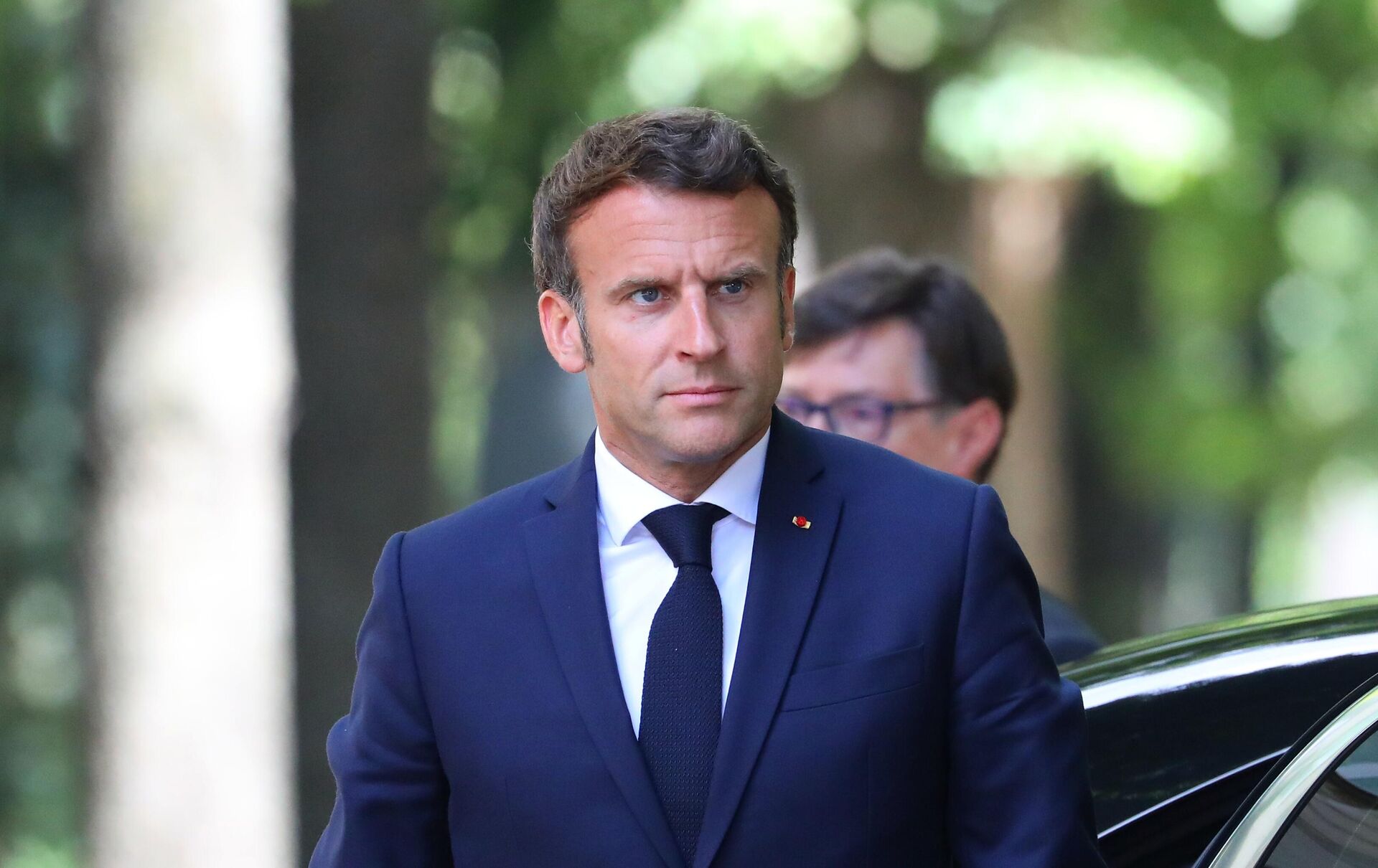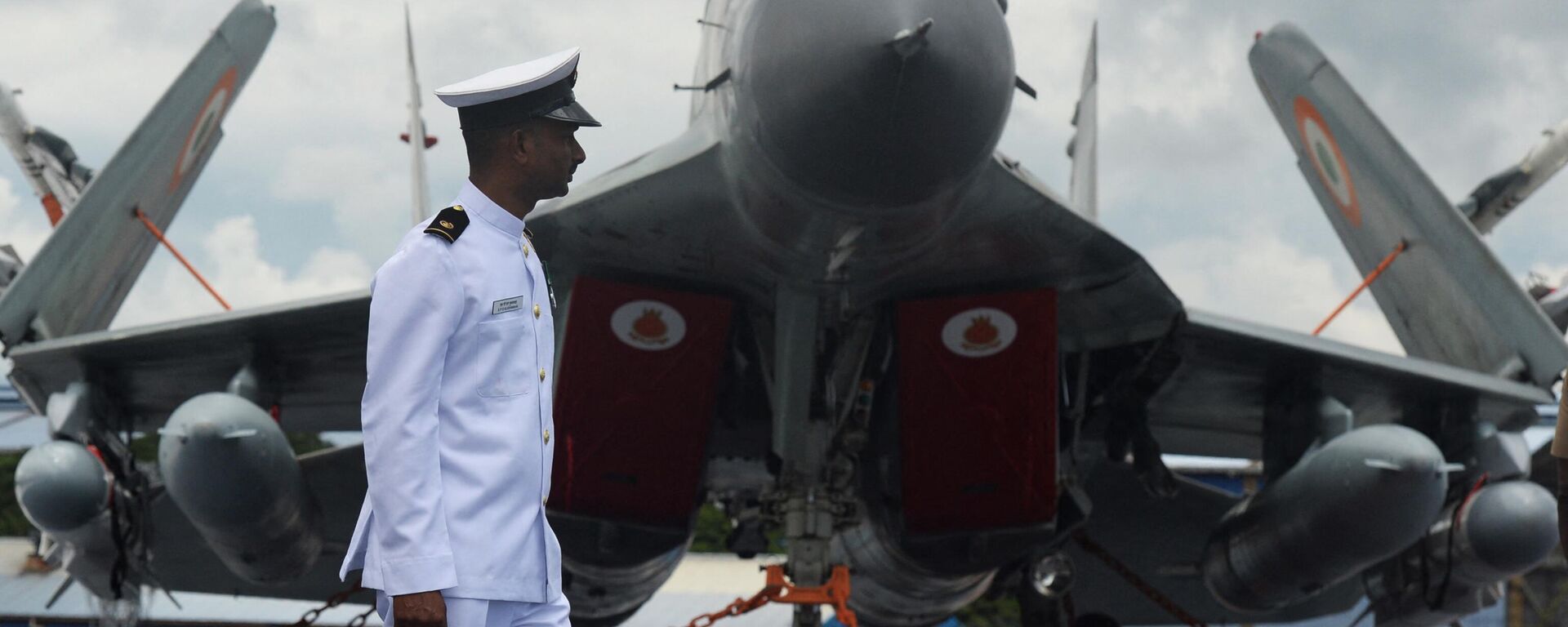https://sputniknews.in/20240309/peaceful-resolution-of-ukraine-conflict-possible-6784083.html
Peaceful Resolution of Ukraine Conflict Possible
Peaceful Resolution of Ukraine Conflict Possible
Sputnik India
Russia's Special Military Operation (SMO) in Ukraine is progressing well, but the US and NATO retain the ability to stretch the conflict far longer than what would be in the best interests of Russia and Ukraine.
2024-03-09T18:44+0530
2024-03-09T18:44+0530
2024-03-09T19:21+0530
sputnik opinion
emmanuel macron
volodymyr zelensky
us
ukraine
russia
nato
european union (eu)
https://cdn1.img.sputniknews.in/img/07e8/02/0d/6527873_0:0:3284:1847_1920x0_80_0_0_187e788f6e5c57b1e08eec0c236508ad.jpg
The continuing loss and maiming soldiers are undesirable, as there is the possibility of a grievous escalation in the conflict that could result in a wider conflict, or even end human civilisation.US and NATO nations, who are battling Russian forces using Ukrainian forces as proxies, are oblivious to the human losses since they are fighting Russia using their cunning, not their soldiers. They ignore the dangers of an escalation, firm in their belief that Russia, which lost 25 million citizens during WW-II, will not risk an escalation.No Perceivable Off Ramp for Peaceful ResolutionOver two years since the start of the SMO on February 24, 2022, a peaceful resolution to the conflict appears more elusive than it was at the start of the conflict. Indeed, the Russian posture towards the conflict may have hardened over the two years. The perfidy of the West in sabotaging the peace agreement arrived at Istanbul between Russian and Ukrainian negotiators in May 2022 has completely eroded Russian trust in the West.From the point of view of the US and NATO, the laboured retreat of Ukrainian forces is not alarming. Only a cascading collapse of Ukrainian front lines would be indicative of an imminent military reversal, and the emergence of an alternative Ukrainian leadership that is ready to make peace with Russia would be indicative of an imminent political reversal.From the Russian point of view, a successful intervention by NATO forces combined with missile attacks deep into Russian territory would be perceived as a military reversal, and a decapitating strike on top Russian leadership, however unlikely, would be perceived as a political reversal.As such, it's unlikely that either side will perceive a military or political reversal over the next one year at the least. Also, a Ukrainian reversal is more in the realm of possibility than a Russian reversal.Based on the current trajectory of the conflict - with Ukraine steadily losing ground - it is likely that a cascading collapse of Ukrainian front lines will eventually occur.In view of the Presidential elections this year, the US might be tempted to let the conflict play out for one more year, giving Ukraine enough assistance to stretch the war till the spring of 2025, when the next Presidency will be firmly in place.NATO Intervention a PossibilityHowever, it is possible that additional assistance to Ukraine may not succeed in preventing the cascading collapse of Ukrainian military frontlines. In which case, the US and NATO could resort to an alternative way of stretching the war - through the deployment of expeditionary forces by some NATO nations. It appears that France is spearheading this alternative approach.The deployment of the expeditionary force would be low key to begin with in order to, as Macron put it, present Russia a strategic dilemma. The French expeditionary forces would not be deployed along the front line. They would be deployed well within Ukrainian territory. The pretext could be protection of Western interests or properties in Ukraine.The aim of the deployment would be, not to engage Russian forces immediately, but to force Russia into militarily preparing for the possibility as Russian forces advance, thereby slowing down, or bringing to a complete halt, the Russian advances. It would ensure that the US and NATO would not have to deal with a military reversal in Ukraine at least until the spring of 2025. The hope being that the NATO intervention would result in a stalemate, not escalation.Russia's Strategy to Deter NATO InterventionFrom the very beginning of its SMO, Russia has calibrated its military campaign in a manner that has allowed it to retain its ability to simultaneously fight NATO, in case of an intervention.Except during the initial shock and awe phase, Russian forces have conducted their operations in a manner that has allowed them to retain their ability, in terms of men and weapons, to defend Russia against a NATO intervention. The Russian strategy has been effective so far, but Western desperation is now on the rise.The NATO intervention proposed by French President Macron is designed to "deter further Russian advances into Ukraine". The intervention, it is hoped, would prevent Russia from achieving its SMO goals of demilitarisation and denazification of Ukraine.However, the French proposal is based on a delusional assumption that Russia will not engage French troops stationed in Ukraine, if they are not at the battlefront. Even if purely conceived as a way of pressuring Russia, the proposal is grotesquely misconceived as Russia's right of defence covers any military assets stationed in Ukraine.The Road to PeaceThe big question is whether a peaceful resolution is possible? As long as NATO exists, the likely answer is no.Logically, EU security should be assured through an EU security alliance. The NATO alliance makes EU security interests subservient to US security interests, which makes no sense!Dissolving NATO in favour of an EU security alliance at this stage would be perceived in Western countries as a capitulation to Russia.A simple way out for the US would be to dump the current regime in Ukraine through "democratic elections", followed by a ceasefire and negotiations between Ukraine and Russia for a Minsk like agreement guaranteed by the EU, China, Russia, and the US.Following the ceasefire, NATO could be dissolved and replaced by a EU security alliance.The Russian leadership has remained open to settling the dispute through negotiations. Zelensky has not. "Democratic elections" will give the Ukrainian people a voice.
https://sputniknews.in/20240302/india-russia-defence-cooperation-strengthens-through-technology-transfers-6719178.html
us
ukraine
russia
Sputnik India
feedback.hindi@sputniknews.com
+74956456601
MIA „Rossiya Segodnya“
2024
News
en_IN
Sputnik India
feedback.hindi@sputniknews.com
+74956456601
MIA „Rossiya Segodnya“
Sputnik India
feedback.hindi@sputniknews.com
+74956456601
MIA „Rossiya Segodnya“
ukraine, ukraine-russia war, ukraine latest
ukraine, ukraine-russia war, ukraine latest
Peaceful Resolution of Ukraine Conflict Possible
18:44 09.03.2024 (Updated: 19:21 09.03.2024) Russia's Special Military Operation (SMO) in Ukraine is progressing well, but the US and NATO retain the ability to stretch the conflict far longer than what would be in the best interests of Russia and Ukraine.
The continuing loss and maiming soldiers are undesirable, as there is the possibility of a grievous escalation in the conflict that could result in a wider conflict, or even end human civilisation.
US and NATO nations, who are battling Russian forces using Ukrainian forces as proxies, are oblivious to the human losses since they are fighting Russia using their cunning, not their soldiers. They ignore the dangers of an escalation, firm in their belief that Russia, which lost 25 million citizens during WW-II, will not risk an escalation.
No Perceivable Off Ramp for Peaceful Resolution
Over two years since the start of the SMO on February 24, 2022, a
peaceful resolution to the conflict appears more elusive than it was at the start of the conflict. Indeed, the Russian posture towards the conflict may have hardened over the two years. The perfidy of the West in sabotaging the peace agreement arrived at Istanbul between Russian and Ukrainian negotiators in May 2022 has completely eroded Russian trust in the West.
From the point of view of the US and NATO, the laboured retreat of Ukrainian forces is not alarming. Only a cascading collapse of Ukrainian front lines would be indicative of an imminent military reversal, and the emergence of an alternative Ukrainian leadership that is ready to make peace with Russia would be indicative of an imminent political reversal.
From the Russian point of view, a successful intervention by NATO forces combined with missile attacks deep into Russian territory would be perceived as a military reversal, and a decapitating strike on top Russian leadership, however unlikely, would be perceived as a political reversal.
As such, it's unlikely that either side will perceive a military or political reversal over the next one year at the least. Also, a Ukrainian reversal is more in the realm of possibility than a Russian reversal.
Based on the current trajectory of the conflict - with Ukraine steadily losing ground - it is likely that a cascading collapse of Ukrainian front lines will eventually occur.
In view of the Presidential elections this year, the US might be tempted to let the conflict play out for one more year, giving Ukraine enough assistance to stretch the war till the spring of 2025, when the next Presidency will be firmly in place.
NATO Intervention a Possibility
However, it is possible that additional assistance to Ukraine may not succeed in preventing the cascading collapse of Ukrainian military frontlines. In which case, the US and NATO could resort to an alternative way of stretching the war - through the deployment of expeditionary forces by some NATO nations. It appears that France is spearheading this alternative approach.
The
deployment of the expeditionary force would be low key to begin with in order to, as Macron put it, present Russia a strategic dilemma. The French expeditionary forces would not be deployed along the front line. They would be deployed well within Ukrainian territory. The pretext could be protection of Western interests or properties in Ukraine.
The aim of the deployment would be, not to engage Russian forces immediately, but to force Russia into militarily preparing for the possibility as Russian forces advance, thereby slowing down, or bringing to a complete halt, the Russian advances. It would ensure that the US and NATO would not have to deal with a military reversal in Ukraine at least until the spring of 2025. The hope being that the NATO intervention would result in a stalemate, not escalation.
Russia's Strategy to Deter NATO Intervention
From the very beginning of its SMO, Russia has calibrated its military campaign in a manner that has allowed it to retain its ability to simultaneously fight NATO, in case of an intervention.
Except during the initial shock and awe phase, Russian forces have conducted their operations in a manner that has allowed them to retain their ability, in terms of men and weapons, to defend Russia against a NATO intervention. The Russian strategy has been effective so far, but Western desperation is now on the rise.
The NATO intervention proposed by French President Macron is designed to "deter further Russian advances into Ukraine". The intervention, it is hoped, would prevent Russia from achieving its SMO goals of demilitarisation and denazification of Ukraine.
However, the French proposal is based on a delusional assumption that Russia will not engage French troops stationed in Ukraine, if they are not at the battlefront. Even if purely conceived as a way of pressuring Russia, the proposal is grotesquely misconceived as Russia's right of defence covers any military assets stationed in Ukraine.
The big question is whether a peaceful resolution is possible? As long as NATO exists, the likely answer is no.
Logically, EU security should be assured through an EU security alliance. The NATO alliance makes EU security interests subservient to US security interests, which makes no sense!
Dissolving NATO in favour of an EU security alliance at this stage would be perceived in Western countries as a capitulation to Russia.
A simple way out for the US would be to dump the current regime in Ukraine through "democratic elections", followed by a ceasefire and negotiations between Ukraine and Russia for a Minsk like agreement guaranteed by the EU, China, Russia, and the US.
Following the ceasefire, NATO could be dissolved and replaced by a EU security alliance.
The Russian leadership has remained open to settling the dispute through negotiations. Zelensky has not. "Democratic elections" will give the Ukrainian people a voice.




